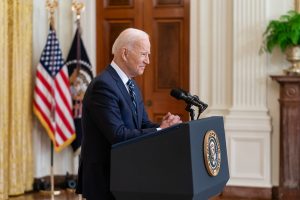Washington sees the rules-based order as a winning card in its competition with Beijing. U.S. President Joe Biden forecast “extreme competition” early in his term but added, “I’m not going to do it the way [former President] Trump did. We’re going to focus on international rules of the road.” Similarly, Secretary of State Antony Blinken has emphasized that “our purpose is not to contain China, to hold it back, to keep it down. It is to uphold this rules-based order that China is posing a challenge to.”
Why so much talk about the rules? Partly because the Biden administration genuinely believes that the order must be defended. But partly because, more than ever, the United States needs allies and partners. Washington’s friends are leery of escalatory rhetoric and unrealistic objectives such as former Secretary of State Mike Pompeo’s goal of “ensuring that China retains only its proper place in the world.” They are more likely to rally in support of defending an order from which they have all benefited.
In the contest for international legitimacy it makes sense for the United States to target a Chinese vulnerability: Its disregard of accepted international norms. At the China-U.S. meeting in Anchorage, Blinken listed some of the most egregious violations – “Xinjiang, Hong Kong, Taiwan, cyberattacks on the United States and economic coercion toward our allies” – but made no mention of the South China Sea.
Yang Jiechi, director of the Office of the Central Commission for Foreign Affairs, responded with an audacious bid for the moral high ground. He declared that “what China and the international community follow or uphold is the United Nations-centered international system and the international order underpinned by international law, not what is advocated by a small number of countries of the so-called rules-based international order.”
Yang’s riposte correctly identified a U.S. vulnerability. The “rules-based order” is a novel and vague description of how the world should work. More established and legitimate descriptions refer to the United Nations and international law. Although the U.S. shaped the U.N. and much of international law, its relationship to these institutions has become increasingly vexed, especially since the 2003 invasion of Iraq. That’s partly why it fallen back on the “rules-based order.”
Can China make a better claim to identify itself with the U.N. and international law? For anyone familiar with recent Chinese behavior, Yang’s claim strains credulity. But there are reasons to think his argument might be more be more internationally persuasive than Washington appreciates.
As the United States has pulled back from the U.N., China has stepped up. It is now the second-largest contributor to both the U.N.’s regular budget and the peacekeeping budget. Chinese nationals head four of the U.N.’s 15 specialized agencies. China provides more personnel to peacekeeping operations than any other permanent member of the Security Council.
Whether or not China is using this engagement to “uphold is the United Nations-centered international system” is a matter of perspective. A detailed survey by Ian Johnston has shown that Beijing can plausibly claim to be supporting many elements of the existing international order. For example, it usually votes with U.N. General Assembly majorities and uses its U.N. Security Council veto sparingly. But other scholarship has shown how China is steadily bending international institutions and norms to accord with its preferences and remove the liberal values they often embody.
But even if the United States and its allies can demonstrate how China is changing the rules-based order from within, it is questionable how many countries would care. Many “swing states” care much less about liberal values than they do about defending their sovereignty from external interference. Beijing’s stated commitment to non-interference sounds attractive, even if it is only rhetorical. This desire to protect sovereignty and avoid external scrutiny partly explains the reluctance of many states to criticize China’s massive oppression of Muslim minorities in western China.
In the contest for international legitimacy, the United States should avoid sweeping and exaggerated claims of U.S. compliance with, and Chinese violations of, the rules-based order. These lower the bar for Beijing.
More fine-tuned U.S. messaging would be more effective. Rather than characterizing China’s conduct in the South China Sea as undermining the liberal rules-based order, Washington should identify it as a specific and especially egregious violation of international law. The U.N. Convention on the Law of the Sea – which China negotiated, signed and ratified – is fundamental building block of international law. The gravity of this violation can be underscored without referring to liberal values.
In his recent speech in Singapore, U.S. Secretary of Defense Lloyd Austin began to deliver this message. He noted that “Beijing’s claim to the vast majority of the South China Sea has no basis in international law” and supported Southeast Asian nations’ efforts to “protect their sovereignty… as well as the fishing rights and the energy resources afforded them by international law.”
This message would, of course, carry more weight if the United States itself ratified UNCLOS. Its failure to do so makes it easy for China to portray the U.S. as hypocritical. The fact that the U.S. accepts UNCLOS as customary law is legally significant, but of limited help in the court of public opinion.
The Biden administration clearly recognizes that demonstrating success at home is the key to international defense of the democratic model. Similarly, improved U.S. compliance with international norms would greatly enhance U.S. defense of the rules-based international order.
Liberal internationalists have long maintained that U.S. leadership of the post-war order has been distinguished from that of previous hegemons by its restraint. They argue that by complying with the rules, Washington was able to win wider support for the U.S.-led liberal order. The extent to which the United States has actually been restrained and compliant is still actively debated. But, either way, it’s not too late for the U.S. to attempt this model of leadership and strengthen its claim to the moral high ground. And the need is growing.
































